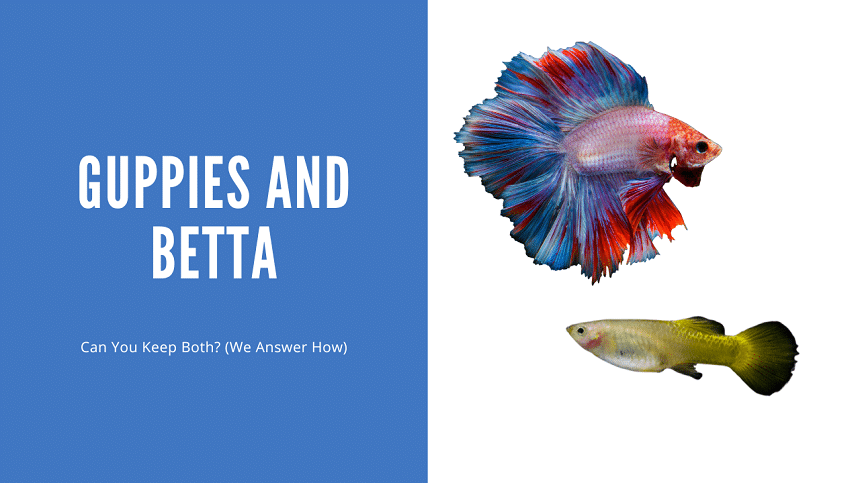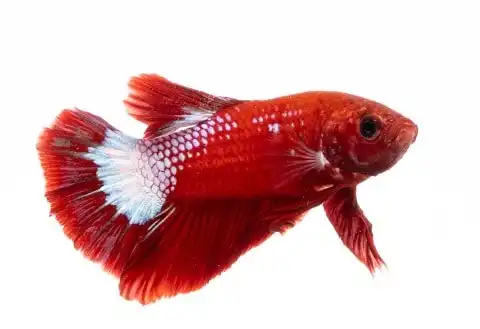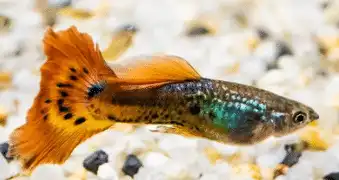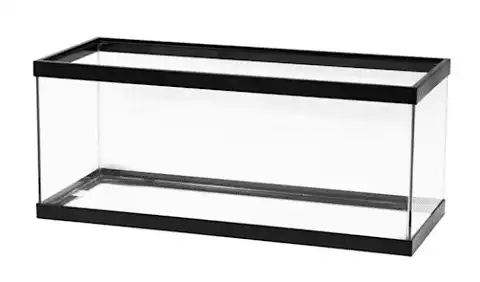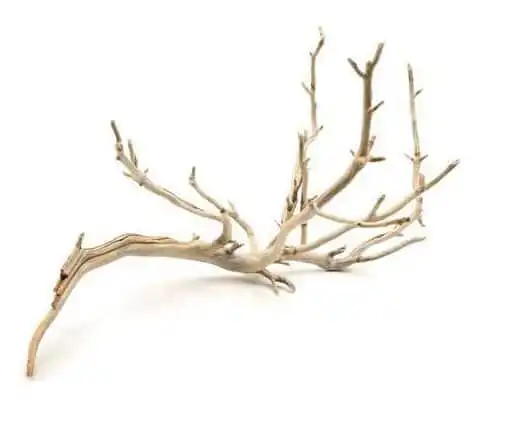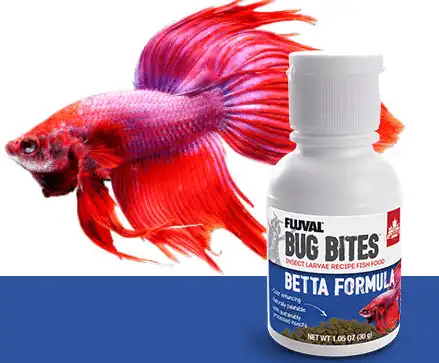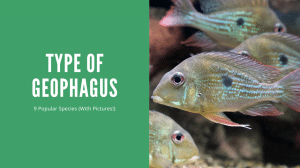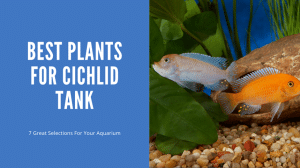Thank you for visiting! By the way… any links on this page that lead to products on Amazon and other stores/partners are affiliate links Aquarium Store Depot earns a commission if you make a purchase.
Guppies and Bettas are some of the most popular species of tropical fish in the hobby. You likely come to this article researching online and wonder if these two types of fish can peacefully coexist. I have good and bad new for you. The good news is that you certainly can keep both species. The bad news is that it takes work and careful selection to pull it off. I’ll go deeper in this blog post and answer all your questions. Ready to get started? Let’s begin!
Key Takeaways
- It is possible for betta fish and guppies to coexist in the same tank, with careful consideration of their temperaments, coloration, & tank setup.
- To keep them healthy & reduce aggression, provide a varied diet that meets each species’ needs plus decorations & hiding spots.
- Monitor for signs of aggression and consider alternative tank mates if needed.
Understanding Guppies And Betta Fish
Guppies and bettas can be kept together in a shared tank under certain conditions. It’s important to take into account their individual temperaments, the colors of the guppies, whether they are male or female, as well as the aquarium setup when deciding if it is suitable for them both. To understand how these two species interact with each other alongside any potential cohabitants, let’s analyze what similarities and differences there may be between these different types of fish.
Betta Fish Overview
Use Coupon Code ASDFISH at Checkout
Betta Fish are one of the most beautiful varieties of freshwater fish available in the hobby. Easy to care for with plenty of varieties!
Bettas, also known as Siamese fighting fish, are native to the warm waters of Southeast Asia1. Male betta fish have vibrant colors and long fins that can be seen in their natural habitats. They tend to be territorial and may fight with other male bettas or similar-looking species for dominance. Some varieties like true Halfmoon or Delta Bettas are considered more peaceful. However, other breeds like Plakat breeds, are typically known for being aggressive. We have a blog post that details out how to select a less aggressive Betta fish. Check it out here.
On the other hand, guppies from South America bring brightness into any aquarium thanks to their brightly colored tails – especially on males which stand out compared to larger females who lack coloration but still make a stunning addition when brought together with Bettas in one tank where it’s important enough space is provided so both kinds feel comfortable living side by side (though guppies enjoy eating betta food too).
Guppy Overview
An undemanding fish that is a livebearer. Many varieties available
Guppy fish, a member of the Poeciliidae family, are known for their remarkable colors and iridescent shine, which is created by reflective cells called iridophores. They have been known as millionfish or mistakenly as rainbow fish. The males measure between 0.6 to 1.4 inches, while female guppies grow larger, typically from 1.2 to 2.4 inches long. When given suitable tank conditions, guppies can remain healthy over three years of life in various aquatic settings like rivers, streams or ponds.
When considering breeding these livebearers give birth not just once, but multiple times due to their fast growth rate so it’s important that if you’re housing them with betta fish there will be overcrowding issues and possible aggression from your Betta as fry grow.
Tank Requirements
Having the proper habitat is essential for bettas and guppies to peacefully live together. Establishing a tank with the correct dimensions, decorations, hiding spots, and water properties can decrease aggression risks while providing an amiable atmosphere for both pet fish species.
Ideal Tank Size
It is strongly suggested to have an aquarium with a minimum capacity of 10 gallons for housing bettas and guppies together. Having larger tanks will ensure better living conditions, making it possible for the two species to mark their respective territories without excessive disputes between them.
For instance, keeping one single betta along with six guppies can be suitably done in an aquarium 15 or 20 gallons. Always take into account how many fish you intend on having before deciding your tank size as this way they are able to live comfortably within that environment.
For best results, a 20 gallon long tank is the best to use as the length is over 24 inches. Male bettas will establish a territory of 24 inches in length, so this gives space to curb any aggression issues.
A classic 20 gallon aquarium in its 30 inch long variant. A very popular aquarium.
Decorations And Hiding Spots
It is essential for the well being of both bettas and guppies that they have access to a variety of decorations as well as hiding places. Decorative items such as artificial or live plants, driftwood, rocks, and caves give these fish an enjoyable environment with added safety benefits in order to reduce any stress induced by aggression. It’s important there are plenty of hidey holes available for each species so no uncomfortable situations arise between them.
Editor's Choice
Manzanita offers it all. Great shape, low tannins, quick to water log and reasonably priced. It's the ultimate driftwood!
Since we are talking about Betta fish here, we also need to be extra careful about the type of decor we choose. We need to avoid decor that has sharp, jagged, or rough edges. Decorations with these characteristics pose a hazard to our Betta’s delicate fins. Severe injuries or stress can lead to conditions like fin rot.
Water Parameters And Filtration
To ensure bettas and guppies thrive, it is essential to maintain the correct water parameters. Betta fish live in warmer temperatures of 78°F to 80°F, while Guppies prefer a cooler 72-82 °F range. Guppies need an ideal pH level of 7.0 -7.2 and harder water for optimal living conditions. In comparison, Bettas tend towards softer water instead. However, Guppies can be accumulated better to the Betta’s environmental preferences than the Betta can.
It is vital that you select suitable filtration systems to keep their environment clean. As Betta’s favor gentle flow rates when filtering their tanks, it is suggested that this be kept low with adjustable settings if possible. A sponge filter can fit the bill and keep things gentle. Power filters and canister filters are going to be more appropriate for planted tank setups, though. Both these filters should have ways to adjust the filter flow, and you can put a sponge on the intake to protect your Betta.
The Best Aquarium Power Filter
The worlds best selling and most reliable power filter on the market. Unchanged for years because it's so reliable and versatile
Gender Considerations
When deciding whether male and female bettas can cohabitate with guppies in the same aquarium, gender plays a significant factor. It is important to be mindful of both species’ sexes and how it will impact their relationship dynamic.
Males Considerations
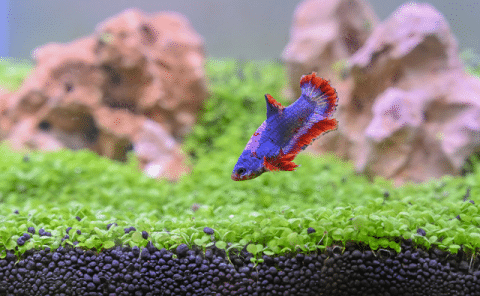
Male bettas are known for their potentially aggressive tendencies and should not be housed with colorful male guppies, as the colorful fish may become a target of attack. Keeping a female guppy in combination with a single male betta is possible. Precaution must still be taken to maintain an appropriate ratio of 1:3 females-to-male during cohabitation. This helps ensure that no one fish will bear too much attention from the betta while letting other individuals establish hierarchical relationships among themselves peacefully.
If you are going to attempt to house male guppies, choose breeds that are not colorful. Breeds like the Lyretail guppy will typically be identified as a threat by the Betta. Nonfancy types and feeder guppies are good candidates as they are not very colorful.
Though it’s feasible to house lady guppies together with a sole Mr Betta, it’s best practice to check on them regularly in order to guarantee they all get along just fine without any hostile behavior occurring between either species. In cases where animosity arises, you may wish to consider housing the Betta separately.
Female Interactions
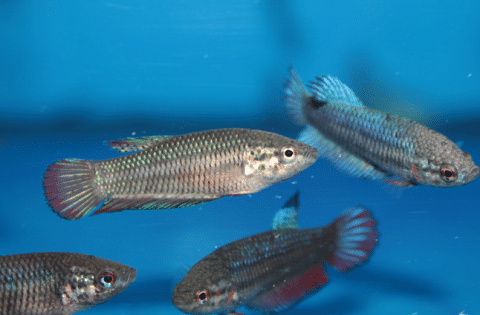
When it comes to female bettas, they are usually more relaxed and less aggressive than males. This makes them a suitable choice when kept with guppies. To ensure that there is harmony among your tankmates, pay close attention to their behavior and how well things are going between them.
An adequately set up aquarium, along with stable water conditions plus enough food could bring about a peaceful atmosphere in tanks housing both bettas and guppies if these two species mix together. Your best chances of success would be only introducing one female betta to live with guppies.
Feeding And Dietary Needs Of Both Species
When it comes to keeping bettas and guppies in the same tank, a varied diet is essential for their well-being. While both can each others foods, it is not the healthiest for them.
Bettas are carnivores by nature and need protein rich diets. Meanwhile, guppy fish are omnivores and need more plant based diets. While guppies eat betta food, it will not be healthy for them long-term.
Types Of Food
Bettas and guppies both benefit from a diverse nutritional regimen, which can include flakes, pellets, or freeze-dried items such as blood worms, brine shrimp, and daphnia. Being carnivores, Bettas thrive on insect rich diets. Fluval Bug Bites are an excellent choice for a staple for them.
Best Betta Food
Fluval bug bites is made of various insect and shrimp ingredients making this a high quality source of protein
You should mix all the types of food and varieties in your regimen to vary up the food you feed your fish. This will lead to feeding them a well balanced diet.
Feeding Schedule And Frequency
Because the guppy fish will eat the Bettas food, we need to make sure our Betta fish is well feed as hunger can lead to aggression. The way to resolve this is to feed your guppies first. When you feed your guppies, feed them a plant rich diet. Your Betta will learn not to go after this type of food over time. Once the guppies are fed, feed your Betta. While the guppies may still eat the Betta’s food, the guppies will still be getting a plant rich diet. Since the guppies are already fed, it’s less likely for them to eat the Betta’s food.
Ideally, you should feed both fish daily with a single day fast every week to clear their digestive tracts.
Monitoring And Managing Aggression
Despite the prospect of bettas and guppies coexisting harmoniously in an aquarium, it is necessary to watch out for any potential signs of aggression so that both species can thrive peacefully.
Signs of aggression are worrisome and need to be addressed right away. Let’s look into this in the next section.
Signs Of Aggression

Watching your guppies and betta fish for signs of aggression is key. This can involve chasing, nipping fins, shredding fins or a loss of appetite on either’s part, along with changes to coloration, which could indicate distress. For the Bettas, flaring behavior is another sign of aggression towards the guppies. It is more than likely that the Betta fish will be the aggressor if there are any aggressive actions. With larger livebearers like molly fish, this may be the opposite with the males of the species, but generally, guppies are pretty passive and easygoing.
Preventing And Addressing Aggression
In order to mitigate and respond to hostility between bettas and guppies, it is essential that there are a lot of places for them both to hide, as well as decorations in the tank. The best way to prevent aggression is to introduce the Betta last. Place the betta in a breeding box and observe the behavior as the guppies try to interact with it. If you see a lot of flaring, that is a warning sign to you that you will likely have conflict in the tank.
Breeding And Cohabitation
While your guppies can bred in the tank with a Betta present, the guppy fry will most certainly be devoured by the Betta. Any guppy fry under a month of age is a likely target by the Betta to be eaten. In other to breed successfully you will need to remove the fry and raise them in a separate tank and introduce them back when they are old enough. However, it’s important to note the overstocking is a very real issue with livebearers. It is probably best not to consider breeding each fish if you plan to house them together.
Alternative Tank Mates
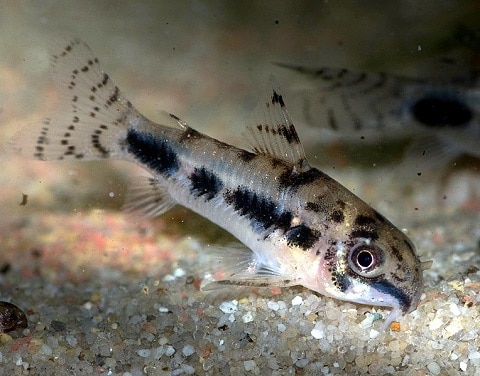
If bettas and guppies are incompatible, there are still other community fish species that can create a peaceful community tank. Platyfish, ghost shrimp, cherry shrimp, Corydoras catfish, and Amano shrimps all make perfect mates for guppies.
For the betta fish, the best alternatives are bottom dwelling fish or to try a larger livebearers like a swordtail or molly. In most cases, it’s better to return the Betta to the pet store and either try with another Betta or pass on keeping any Bettas with the guppies.
Frequently Asked Questions
Do betta fish get along with guppies?
It is possible to house betta fish and guppies together, provided the tank is large enough and the environment remains peaceful. The key here is having a well decorated environment with lots of shelter, keeping both fish species well fed, and carefully selecting both betta fish and guppy breeds.
Why is my betta attacking my guppies?
Your Betta is attacking your guppy because it likely looks too much like them. Fancy guppies are typically targeted due to their colorful scales and tails. They are seen as competition in the Betta’s territory. If your tank is on the small end, your guppies will have no means of escape. If you have a large enough tank (20 gallons or more), you may need to remove the Betta and possibly get another less aggressive Betta breed if reintroduction after several days does not work.
How many guppies can you have in a 5 gallon tank with a betta fish?
It is NOT recommended to place any guppies with a Betta in a tank that is 5 gallons. You are best suited to keep a single betta alone in a 5 gallon tank. You may consider some snails if your filtration can handle it. 10 gallons is the minimum to consider any other fish tank mates with a betta. The space is too small and the territory claimed by the betta is too large for aggression to be curbed if it occurs. It’s best to consider a 5 gallon tank a betta tank.
What kind of guppies can live with bettas?
To avoid any potential hostility, it is recommended that Bettas be kept with guppies of a dull coloring that distinguishes them from the former.
What fish cannot go with a betta?
Bettas are a type of fish that have an aggressive and territorial nature. Fish that look like them, such as colorful fancy guppy breeds, gouramis, and paradise fish should be avoided.
Closing Thoughts
By considering the different traits of bettas and guppies, we can achieve an effective coexistence for both species within one tank. Through proper planning, monitoring, and maintenance, it is possible to create a balanced ecosystem where these aquarium fish will thrive simultaneously. As long as all requirements are met in accordance with understanding their natural behavior patterns, there is no reason why they cannot peacefully share living quarters while you get to enjoy watching them swimming together every day!
Have you successfully kept a Betta with your guppies? If so, let us know your stories in the comments below. Until next time!
- About the Author
- Latest Posts
I’m thrilled that you found Aquarium Store Depot! Here you’ll find information on fish, aquariums, and all things aquatics related. I’m a hobbyist (being doing this since I was 11) and here to help other hobbyists thrive with their aquariums! I adhere to a high quality Editorial Process and Review products with real life field usage and practical analysis.

